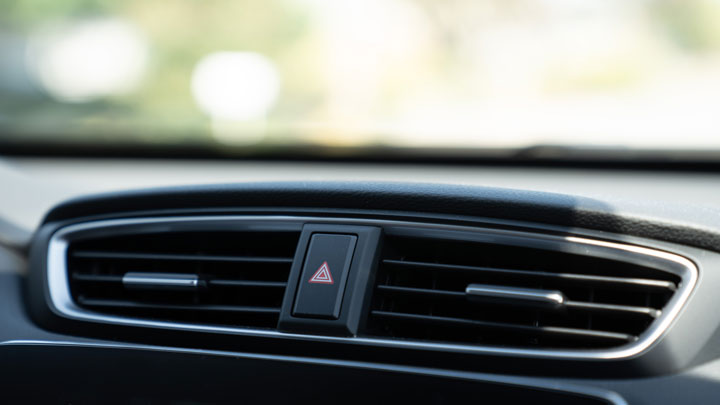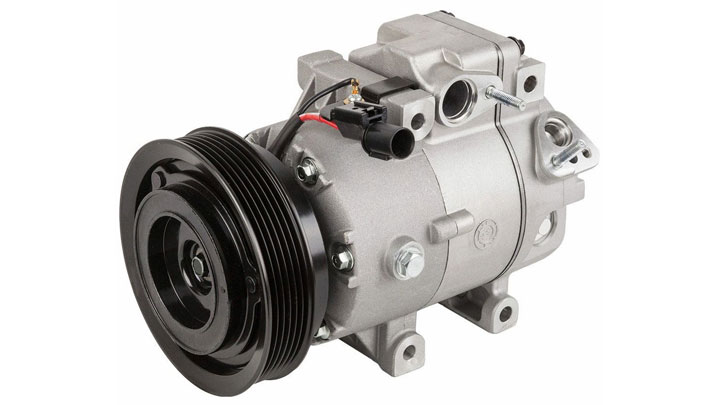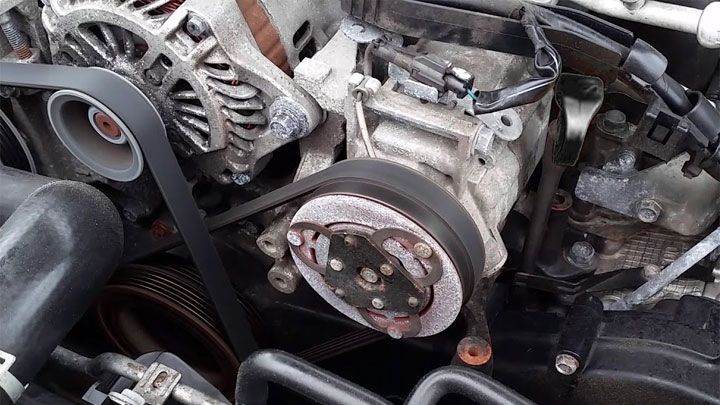Last Updated on November 14, 2022
Ah, the wind in your face, the road signs passing by as you drive down Route 25. You know where you’re going, you always know because you’re going to work! You do this every day and it’s the heat of summer when you’d rather be at the beach.
No matter, you need money and it’s really not that bad driving to work today, although the A/C could be blowing a bit colder. That air isn’t even close to cold, at least how you remember it anyway. What’s going on?
You try flipping the A/C on and off, like every tech support person tells you, and that does nothing! You change to hot, change to cold and still your car still insists on smacking your face with a burst of warm air.
You pull into the office frazzled, sweaty, and grumpy because you know there’s a problem with your ride, it’s just not clear exactly what that is!
Well, I’ll just make it easy for you, dear reader, and tell you it’s likely a bad A/C compressor.
Related: How Running A/C Affects Gas Mileage
How a Car A/C Compressor Works

In order to get sweet, cold air pumping through your vents onto your sweaty brow, your air conditioning system needs to go through its processes. The refrigerant you use to “recharge” your A/C needs to turn from a gas to a liquid to a gas over and over endlessly to cool you down as you drive.
The A/C compressor exists solely to transform low pressure, low-temperature gas to high pressure, and consequently high-temperature gas. Think about it like high school chemistry class; as gas is compressed, the molecules are forced closer together where they move faster, generating heat. The compressor in your car is very similar.
A plate inside (called a “wobble plate”) is rotated around a central axis, taking low-pressure air and pushing it out through a smaller hole than it came in, creating a higher pressure, higher temperature gas to go through the air condenser, making usable liquid with which to cool your sweaty pits!
An oversimplification of course, but you get the picture! If you want more details about how a car air conditioner compressor works, check out this video.
The compressor looks like a belt-driven, engine-mounted, pulley-lookin’ thing that you’ve most definitely seen if you’ve spent any time under the hood. And it’s DEFINITELY an item you’ve lusted over during a hot summer’s day in a car with no air conditioning.
To summarize, you’ll need a compressor that runs in order to get cold air in the cockpit of your sick 1999 Honda Accord 😉
Bad A/C Compressor Symptoms
There are several symptoms of a bad compressor, and they may not all be apparent upon initial inspection, so I want to go through them all:
#1 – The Car Won’t Blow as Cold as It Once Did

It could be gradual, and you may not notice it at first, but sooner or later you will be sweating like a pig in your Toyota and have the A/C on full blast on hot summer day.
This could be due to a leak in your conditioning system, but more than likely it’s due to a faulty compressor, so you’ll want to check that out.
Related: 8 Reasons Why Your A/C Is Not Blowing Cold Air
#2 – Strange Noise
As with most car-related issues, a noise is usually the sign of something moving where it shouldn’t (unless you’re talking about your buddy’s turbocharged, six rotor RX-7, HA)
On the other hand, when talking about your compressor, interesting noises are NOT a good sign, especially when they only occur during air conditioning operation. Here’s a good video example of what a broken air compressor sounds like:
Notice the robotic whining noise, pretty consistent in pitch. And as you move your ear closer to the air compressor, it will get louder!
#3 – Strange Compressor Operation
So, the compressor, like many belt-driven accessories, has a clutch that engages and disengages the operation of said device. If the clutch is seized, the compressor will continue to operate even when the air conditioning is turned off in the cabin.
If the clutch is completely broken, then the compressor just won’t work at all. While you could definitely replace the clutch in this scenario, it’s much easier and time-effective if you just replace the whole compressor.
Read Also: 4 Signs of an Overcharged A/C System
Car A/C Compressor Replacement Cost
Best places to order parts? See: 19 Best Online Auto Parts Stores

You’ll all want to know: “How much will this cost me??”
With a bit of searching on the internet, I came up with $150-$180 for the A/C compressor part itself for my 2004 Toyota Sequoia on PartsGeek or RockAuto. At Advanced Auto Parts and Autozone, you might get out the door paying $150, but I don’t really like the generic Denso/Duralast variants if there’s any possibility you can get OEM.
If you can do the work yourself, add shipping on top of that price, factor 3-4 hours of your time, patience, bloody knuckles, and you’ll come up with a pretty good idea of what investment this project will take.
Even better; call a buddy, buy a six-pack and do it together, six feet apart of course (COVID season), and you’ll have a much better time.
If you aren’t that handy yet with a wrench, or you’d rather spend the money to save time, you’ll need to fork over anywhere from $300-$900 for labor as some cars have more accessible air compressor than others.
Can You Drive With a Faulty A/C Compressor?

You can definitely drive with a faulty air compressor, as it will just be a pulley at that point. There won’t be any draw on the engine, and no resistance to create excess friction.
If you don’t care about air conditioning, just don’t need it, or can’t afford to fix it right now, don’t sweat it (lol). Just make sure that the accessory belt has tension and the compressor wheel isn’t wobbling out of balance.
What Causes an A/C Compressor to Stop Working?
In the best-case scenario, your A/C compressor will stop working if you don’t have enough refrigerant in your A/C system, and at this point, you’ll want to add some!
A/C compressors can accumulate dust, grime, dirt, lubricants, and grit from being in the engine bay. When this happens, the spinning parts of the unit become less efficient and start to wear prematurely. In this case, your compressor will fail and leave you with a conditioning system that no longer works.
As with many other automotive components, dirt/grime/ and caked-on crap is your enemy as it will make your vehicle run poorly.
So there you are. You have just replaced your own A/C compressor and refilled your system with refrigerant, blowing cool, cold air on your sweaty face as you drive back to work!
You emerge victorious as your coworkers cheer and high five you. You know what you’ve done, you are the master of your badass 90s Honda Accord, you are a KING.





I have just recently brought a 2003 Mazda 6 which I was told the a/c compressor was on it’s way out,but it was still drivable.i had not driven it for 4 days,And now it won’t start. Engine turns but it won’t kick over. Would that be due to the bad a/c compressor